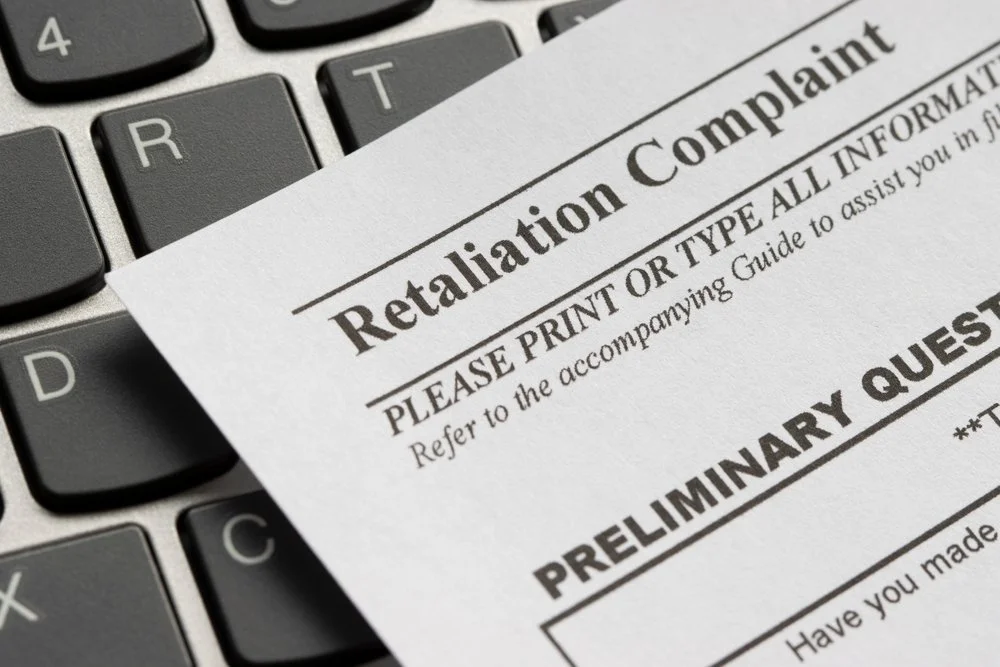Your Legal Rights Against Workplace Retaliation in New York
What Is Workplace Retaliation?
Workplace retaliation happens when an employer punishes an employee for exercising a legal right. It can be subtle or blatant, but in either case, it’s illegal. Under both New York State law and federal law, retaliation is prohibited when it’s in response to protected activities—like filing a complaint, reporting discrimination, or requesting accommodations.
In 2021, New York strengthened protections for employees against workplace retaliation, specifically whistleblower protections under Labor Law Section 740 through Senate Bill S4394A. The legislation strengthened employee rights by including former workers, widening the scope of retaliation, and protecting those who report illegal or dangerous workplace activity.
Common Examples of Retaliation
Retaliation doesn’t always look like getting fired. Sometimes, it’s more insidious. Examples include:
Demotion
Loss of hours after reporting harassment
Negative performance reviews that suddenly appear after you file a complaint
Being passed over for promotions you were clearly qualified for or in line for
Isolation
Micromanagement
Bullying from supervisors
Schedule changes (such as a graveyard shift or weekends) that interfere with childcare, quality of life, or your health
Increased workload or unrealistic expectations designed to push you out.
If any of these happened after you spoke up or asserted your rights, you may have a legal claim.
What Are Protected Activities?
You can’t be legally punished for doing the right thing. Protected activities in New York include reporting sexual harassment, discrimination, or hostile work environments; participating in an internal investigation; filing a complaint with the EEOC or New York State Division of Human Rights; requesting reasonable accommodations for a disability or religion; requesting paid family leave, sick leave, or military leave; filing or threatening to file a workers’ compensation claim; refusing to engage in illegal or unethical conduct; and whistleblowing under New York’s Labor Law Section 740. If you were retaliated against for any of the above, you may be eligible for compensation.
New York Laws That Protect Employees
While federal laws like Title VII of the 1964 Civil Rights Act and the Americans with Disabilities Act (ADA) offer protection, New York goes further. As noted, in recent years, New York State has strengthened retaliation protections by broadening the definition of retaliation to include non-economic harm (e.g., threats, intimidation, humiliation); protecting independent contractors and freelancers, not just employees; extending the statute of limitations for filing claims; and allowing punitive damages and attorney’s fees in many cases.
The bottom line? You have more protection than you might think.
What Should You Do If You're Being Retaliated Against?
If you believe you’re being retaliated against, document everything. Keep emails, texts, performance reviews, and a detailed timeline of events. Report the retaliation to your HR department in writing. Most importantly, get legal advice. Speaking to an employment attorney early can protect your rights and strengthen your case. Don’t quit your job before consulting with an attorney. Quitting may weaken your claim. Let an attorney guide your next move.
How a New York Employment Law Attorney Can Help
Employers rarely admit wrongdoing. They’ll often try to disguise retaliation as performance-based or part of a company restructure. That’s why working with an experienced New York employment attorney such as Legal Ally partner Jessica A. Rounds is critical. Jessica can evaluate your case and determine if retaliation occurred, gather evidence and build a strong narrative, negotiate a settlement or pursue litigation on your behalf, and help recover lost wages, emotional distress damages, and reinstatement if appropriate.
Speaking up shouldn’t cost you your job, dignity, or peace of mind. If your employer punished you for asserting your rights, you may have a strong legal case. And you’re not alone.
Retaliated Against for Speaking Up?
New York law protects you. If your employer demoted, intimidated, or punished you for reporting illegal or unsafe behavior, Legal Ally can help.
Schedule Your Free Case Review
